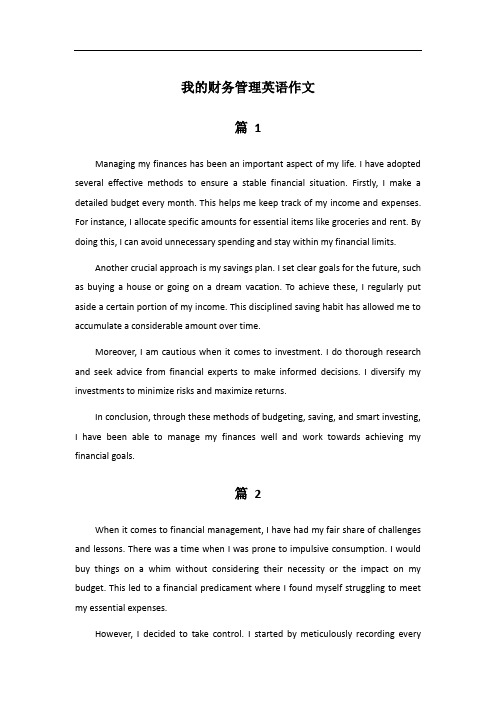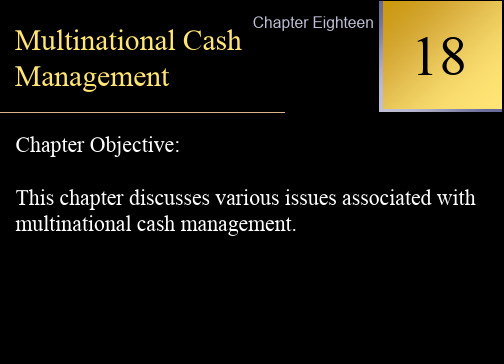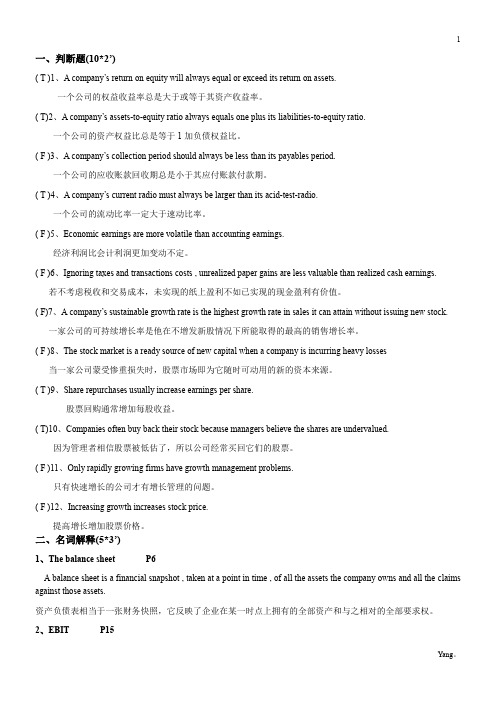财务管理 英文版
我的财务管理英文作文120字

我的财务管理英语作文篇 1Managing my finances has been an important aspect of my life. I have adopted several effective methods to ensure a stable financial situation. Firstly, I make a detailed budget every month. This helps me keep track of my income and expenses. For instance, I allocate specific amounts for essential items like groceries and rent. By doing this, I can avoid unnecessary spending and stay within my financial limits.Another crucial approach is my savings plan. I set clear goals for the future, such as buying a house or going on a dream vacation. To achieve these, I regularly put aside a certain portion of my income. This disciplined saving habit has allowed me to accumulate a considerable amount over time.Moreover, I am cautious when it comes to investment. I do thorough research and seek advice from financial experts to make informed decisions. I diversify my investments to minimize risks and maximize returns.In conclusion, through these methods of budgeting, saving, and smart investing, I have been able to manage my finances well and work towards achieving my financial goals.篇 2When it comes to financial management, I have had my fair share of challenges and lessons. There was a time when I was prone to impulsive consumption. I would buy things on a whim without considering their necessity or the impact on my budget. This led to a financial predicament where I found myself struggling to meet my essential expenses.However, I decided to take control. I started by meticulously recording everyexpenditure, which made me more aware of where my money was going. Then, I set clear consumption rules for myself. For instance, I limited the amount I could spend on non-essential items each month.Another instance was an investment that didn't go as planned. I lost a significant amount of money. But instead of being disheartened, I analyzed my mistakes. I realized that I didn't do enough research and was too hasty in making the decision. So, I learned to be more patient and thorough when considering future investments.Through these experiences, I have come to understand that discipline and careful planning are crucial in managing personal finances.篇 3Managing my finances has been an enlightening journey. I have come to realize the significance of rational consumption and saving. For instance, when I decided to forgo impulsive purchases and instead focused on essential items, I experienced a profound sense of satisfaction. It wasn't just about denying myself immediate pleasures; it was about making more meaningful choices and avoiding unnecessary waste.Another fulfilling aspect is watching my savings grow steadily over time. Every time I check my account and see the numbers increasing, a sense of achievement washes over me. It's a testament to my discipline and commitment to financial stability.I have also learned the importance of budgeting and planning for the future. By setting clear financial goals and adhering to a well-defined plan, I have gained a sense of control and security. This has allowed me to be better prepared for unexpected expenses and to work towards achieving my long-term dreams, such as buying a house or taking a dream vacation.In conclusion, effective financial management has not only brought me peace ofmind but also empowered me to make better decisions for a more prosperous and fulfilling life.篇 4Managing my finances has always been a crucial aspect of my life. I have several significant goals and well-thought-out plans for the future. One of my major aspirations is to purchase a house within the next five years. To achieve this, I have meticulously crafted a detailed financial plan. I am saving a fixed portion of my monthly income and have also invested in some stable financial products to increase my funds. Additionally, I am constantly looking for ways to increase my income through part-time jobs or freelance work.Another goal is to embark on a round-the-world trip. For this dream, I have started setting aside a specific amount of money each month. I am also considering taking on short-term projects that offer higher remuneration to accelerate the savings process. Moreover, I am closely monitoring my spending habits and eliminating unnecessary expenses to ensure that more funds are available for my travel fund.In conclusion, having clear financial goals and well-defined plans is essential for achieving the life I envision. Through discipline and strategic planning, I am confident that I will be able to turn these dreams into reality.篇 5Managing my finances has had a profound impact on my life. A well-organized financial plan brings stability and security. For instance, when I budgeted carefully and saved regularly, I was able to purchase a new home without facing a heavy financial burden. This gave me a sense of accomplishment and peace of mind.However, there have also been times when I failed to manage my financesproperly. I once made impulsive purchases and ignored my budget, which led to a pile of debts and a constant sense of anxiety and stress. I had to struggle to pay off those debts and it took a toll on my mental well-being.In conclusion, proper financial management is like a guiding star in the journey of life. It helps us make wise decisions, achieve our goals, and enjoy a worry-free life. On the contrary, poor financial management can turn our lives into a chaotic mess, filled with worries and uncertainties.。
财务管理英文第十三版

Corporate Capital Gains / Losses
Currently, capital gains are taxed at ordinary income tax rates for corporations, or a maximum 35%.
The Capital Budgeting Process
Generate investment proposals consistent with the firm’s strategic objectives.
Estimate after-tax incremental operating cash flows for the investment projects.
c) - (+) Taxes (tax savings) due to asset sale or disposal of “new” assets
d) + (-) Decreased (increased) level of “net” working capital
e) = Terminal year incremental net cash flow
Depreciation and the MACRS Method
Everything else equal, the greater the depreciation charges, the lower the taxes paid by the firm.
企业财务管理基础知识英文版

The income statement includes items such as operating income, operating costs, taxes and surcharges, period expenses, operating profit, and total profit. Through these data, the profitability and operating efficiency of the enterprise can be understood.
Fundamentals of Enterprise Financial Management
CATALOGUE
目录
Overview of Enterprise Financial ManagementFinancial statements and analysisCapital budgeting and investment decision makingFundraising and Capital Structure ManagementWorking capital management
Financial ratio analysis: By calculating various financial ratios, such as current ratio, quick ratio, inventory turnover ratio, accounts receivable turnover ratio, etc., evaluate a company's debt paying ability, operating ability, and profitability.
财务管理制度英文版

I. IntroductionThis Financial Management Policy (hereinafter referred to as "Policy")is formulated in accordance with the relevant laws and regulations ofthe People's Republic of China, the Company's Articles of Association, and the principles of sound financial management. The Policy aims to ensure the Company's financial stability, enhance the efficiency of financial operations, protect the legitimate rights and interests of shareholders, and achieve sustainable development.II. Scope of ApplicationThis Policy applies to all employees, departments, and affiliated institutions of the Company. It is also applicable to the Company's financial activities, including but not limited to budgeting, accounting, internal control, and financial reporting.III. General Principles1. Compliance with Laws and Regulations: The Company shall strictly comply with the laws, regulations, and policies of the People's Republic of China in its financial management activities.2. Financial Stability: The Company shall maintain financial stability and ensure the timely payment of debts and obligations.3. Efficiency and Effectiveness: The Company shall strive to optimize financial operations, enhance the efficiency of financial resources utilization, and achieve cost-effectiveness.4. Transparency and Fairness: The Company shall ensure the transparency and fairness of financial activities, and provide accurate and timely financial information to all stakeholders.5. Risk Management: The Company shall establish a comprehensive risk management system to identify, assess, and control financial risks.IV. Financial Planning and Budgeting1. Planning and Budgeting Cycle: The Company shall conduct annual financial planning and budgeting. The planning and budgeting cycle shall be consistent with the fiscal year of the Company.2. Budgeting Process: The budgeting process shall be carried out in accordance with the following steps:a. Collection of information: Collect and analyze relevant financial data and market information.b. Formulation of budget: Based on the analysis, formulate the budget plan for the next fiscal year.c. Approval and implementation: Submit the budget plan for approval and implement the budget after approval.d. Monitoring and adjustment: Monitor the budget execution and make necessary adjustments in a timely manner.3. Budget Execution: The budget shall be strictly implemented. Any deviation from the budget shall be analyzed and reported to the relevant authorities for decision-making.V. Accounting and Internal Control1. Accounting Standards: The Company shall adopt internationally recognized accounting standards and comply with the relevant regulations of the People's Republic of China.2. Accounting Records: The Company shall keep accurate and complete accounting records, and ensure the consistency of accounting data.3. Internal Control: The Company shall establish and implement a comprehensive internal control system to prevent and detect financial fraud and errors.4. Auditing: The Company shall conduct internal and external audits to ensure the accuracy and reliability of financial statements.VI. Financial Reporting1. Reporting Period: The Company shall prepare financial statements on a quarterly, half-yearly, and annual basis.2. Reporting Content: The financial statements shall include the balance sheet, income statement, cash flow statement, and statement of changesin equity.3. Reporting Responsibility: The Company's financial department shall be responsible for the preparation and submission of financial statements.4. Disclosures: The Company shall provide accurate and timely financial information to all stakeholders, and make appropriate disclosures of potential risks.VII. Risk Management1. Risk Identification: The Company shall identify potential financial risks, including credit risk, market risk, liquidity risk, and operational risk.2. Risk Assessment: The Company shall assess the impact and likelihood of each identified risk.3. Risk Control: The Company shall implement measures to control and mitigate identified risks.4. Risk Monitoring: The Company shall establish a risk monitoring system to continuously monitor the effectiveness of risk control measures.VIII. Monitoring and Evaluation1. Monitoring: The Company's internal audit department shall monitor the implementation of this Policy and report to the Board of Directors.2. Evaluation: The Company shall conduct periodic evaluations of the effectiveness of this Policy and make necessary improvements.IX. ConclusionThis Financial Management Policy is an important document for the Company's financial management. All employees, departments, andaffiliated institutions shall strictly comply with this Policy and contribute to the Company's sustainable development.。
CashManagement(国际财务管理,英文版)

i.e. the opportunity costs of holding cash
The cost of not keeping enough cash on hand.
i.e. the trading costs associated with having too little cash
Second Edition
EUN / RESNICK
Chapter Outline
The Management of Multinational Cash Balances Cash Management Systems in Practice Transfer Pricing & Related Issues Blocked Funds
$10
$20 $25
$25
$10
$10
$10
McGraw-Hill/Irwin
18-18
Copyright © 2001 by The McGraw-Hill Companies, Inc. All rights
Multilateral Netting
Bilateral Netting would reduce the number of foreign exchange transactions by half:
$10
$40
$25 $25
$1rwin
18-15
Copyright © 2001 by The McGraw-Hill Companies, Inc. All rights
Multilateral Netting
财务管理基础英文版第八版教学设计

Financial Management Basics 8th Edition TeachingDesignIntroductionFinancial management is one of the most crucial aspects of running a business. It involves the management of the organization’s financial resources, such as cash, investments, and accounts receivable/payable. Financial management is therefore an essential course to study for anyone interested in a career in business. This document presents a teaching design for the Financial Management Basics 8th Edition course.Course OverviewThe Financial Management Basics 8th Edition course is designed to provide students with a foundation in financial management principles and practices. In this course, students will learn about topics such as financial statement analysis, time value of money, capital budgeting, and risk management. The course is divided into the following modules:1.Introduction to Financial Management2.Financial Statement Analysis3.Time Value of Money4.Risk and Return5.Capital Budgeting6.Sources of Financing7.Working Capital Management8.International Financial ManagementCourse ObjectivesBy the end of this course, students should:1.Understand the basic principles and practices of financialmanagement.2.Be able to analyze financial statements to determine thefinancial health of a company.3.Be able to apply time value of money techniques to evaluateinvestment opportunities.4.Understand the relationship between risk and return and howit affects financial decision making.5.Be able to apply capital budgeting techniques to evaluatelong-term investment projects.6.Understand the different sources of financing avlable to acompany.7.Be able to manage working capital effectively.8.Have a basic understanding of international financialmanagement.Teaching StrategiesThe following teaching strategies will be employed in this course: LecturesLectures will be used to present course content to students. Instructors will use a variety of teaching ds such as PowerPoint presentations, videos, and handouts to facilitate learning.Case StudiesCase studies will be used to apply financial management principles to real-world scenarios. Students will be expected to analyze the case studies and make recommendations for financial decision making.Group ProjectsGroup projects will be used to enhance students’ colla boration and communication skills. Students will be expected to work in groups to analyze financial statements, develop financial models, and present their findings to the class.ExamsExams will be used to assess students’ understanding of financial management principles. Exams will be divided into multiple-choice, short-answer, and essay questions.Teaching MaterialsThe following teaching materials will be used in this course:1.Financial Management Basics 8th Edition textbook2.PowerPoint presentations3.Case studies4.Financial models5.Online resourcesAssessmentAssessment will be divided into the following components:1.Class participation – 10%2.Case study analysis – 30%3.Group project and presentation – 30%4.Mid-term exam – 15%5.Final exam – 15%ConclusionThe Financial Management Basics 8th Edition course is an essential course for students interested in pursuing a career in business. Through lectures, case studies, group projects, and exams, students will develop a solid understanding of financial management principles and practices. By the end of the course, students should be able to make informed financial decisions and develop financial plans to ensure the long-term success of a business.。
英文财务管理(1)

英文财务管理(1)
Course content
The final section of book consist of five chapters that deal with financial forecasting, derivatives and risk management, multinational financial management, hybrid financing vehicles, and mergers(财务预测, 衍生工具和风险管理,跨国财务管理,混合融资 工具以及合并)。
企业、公司:(firm business enterprise company corporation venture)
英文财务管理(1)
Organization of the Financial Management Function: Figure 1-1
Board of Directors
President(CEO)
英文财务管理(1)
Chapter 1 Goals and Governance of the Firm Topics Covered: w Investment and Financing Decisions w What is a Corporation? w Who Is The Financial Manager? w Goals of the Corporation w Careers in Finance
财务管理分析英文版1

一、判断题(10*2’)( T )1、A company’s return on equity will always equal or exceed its return on assets.一个公司的权益收益率总是大于或等于其资产收益率。
( T)2、A company’s assets-to-equity ratio always equals one plus its liabilities-to-equity ratio.一个公司的资产权益比总是等于1加负债权益比。
( F )3、A company’s collection period should always be less than its payables period.一个公司的应收账款回收期总是小于其应付账款付款期。
( T )4、A company’s current radio must always be larger than its acid-test-radio.一个公司的流动比率一定大于速动比率。
( F )5、Economic earnings are more volatile than accounting earnings.经济利润比会计利润更加变动不定。
( F )6、Ignoring taxes and transactions costs , unrealized paper gains are less valuable than realized cash earnings.若不考虑税收和交易成本,未实现的纸上盈利不如已实现的现金盈利有价值。
( F)7、A company’s sustainable growth rate is the hi ghest growth rate in sales it can attain without issuing new stock.一家公司的可持续增长率是他在不增发新股情况下所能取得的最高的销售增长率。
